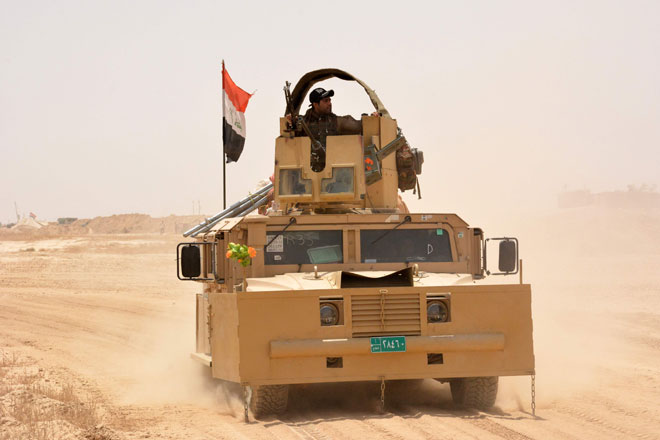BAGHDAD — Iraqi forces hunted extremists in their last Fallujah redoubts Wednesday as tens of thousands of displaced civilians massed in overcrowded camps around the city.
A month exactly after the offensive against the Daesh terror group's bastion was launched, progress on the military front exceeded expectations but so did the scope of the ensuing humanitarian crisis.
"The northern and central parts of Fallujah have almost been cleared of Daesh," Lieutenant General Abdulwahab Al Saadi told AFP, using an Arabic acronym for IS.
"There are few IS [Daesh] fighters left, only in Al Muallemin and Jolan neighbourhoods in the north of the city," said Saadi, the overall commander of the Fallujah offensive.
"The militants in Jolan are offering some resistance but we're pushing back and we've killed a number of them," he said.
Operations against Daesh in northern Fallujah were being conducted by the elite counter-terrorism service and forces from the federal and provincial police.
Prime Minister Haider Al Abadi launched the offensive against the fighter stronghold, 50 kilometres west of Baghdad, a month ago.
After an initial phase of staging operations to encircle Fallujah, elite federal forces stormed the city centre and were able to gain the upper hand relatively quickly.
Abadi declared victory on June 17, saying only small pockets of IS fighters remained after Iraqi forces raised the national flag over the main government compound in the city centre.
Saadi and other Iraqi commanders have said government forces controlled at least three-quarters of the city.
Christopher Garver, the spokesman of the US-led coalition assisting Iraqi forces, said Tuesday that by the US military’s definition, only a third of the city had been cleared.
US forces battling one of Daesh’s previous incarnations in 2004 suffered some of their worst losses since the Vietnam War in Fallujah, despite huge numerical and technological superiority.
Iraqi forces who have been reconquering swathes of territory lost to Daesh two years ago had been expected to face their toughest battle yet and Daesh fighters to defend their emblematic bastion to the death
After breaching the jihadists’ defences in the south of the city, Iraqi forces moved relatively rapidly and despite persistent violence in northern neighbourhoods the outcome of the battle appears in no doubt.
More aid agencies needed
Tens of thousands of starving civilians, who had been living virtually besieged under Daesh rule in and around Fallujah, fled their homes and filled hastily expanded displacement camps.
The influx of families however caught the aid community flat-footed and relief organisations admitted the response was inadequate.
“We have to admit that the humanitarian community has also failed the Iraqi people,” said Nasr Muflahi, Iraq head of the Norwegian Refugee Council, one of the organisations providing aid to people displaced from the Fallujah area.
“There are serious funding shortfalls, but there is no justification why there aren’t more aid agencies helping the people of Fallujah,” he said.
As already existing camps filled way beyond capacity, other camps were being set up but the newly displaced families arriving there often found nothing to sleep on or under, nothing to eat or drink.
At a camp in Khaldiyeh, on the shores of Lake Habbaniyah west of Fallujah, Intikha Mohammed and her three children had to share a two mattresses with 10 other people.
“We have nothing here, just the clothes we are wearing. My four-month-old son is sick, I don’t have enough milk for him and there’s no milk powder at the camp,” she said.
Her tiny boy Ziad, lay all swaddled up on a piece of tarpaulin, sleeping with a baby bottle dangling from his lips as gusts of burning wind filled the tent with orange dust.
More than 80,000 people have been displaced since the start of the Fallujah offensive, bringing to more than 3.3 million the number of Iraqis forced from their homes by conflict since the start of 2014.
Nearly half of them are from the vast province of Anbar, which lies in the heart of the rapidly unravelling “caliphate” the Daesh group proclaimed over large parts of Iraq and Syria two years ago.
Abadi has said the next target for his forces was Mosul, Daesh’s defacto capital in Iraq and the country’s second city.
